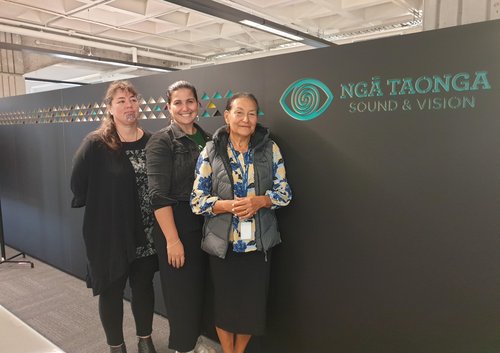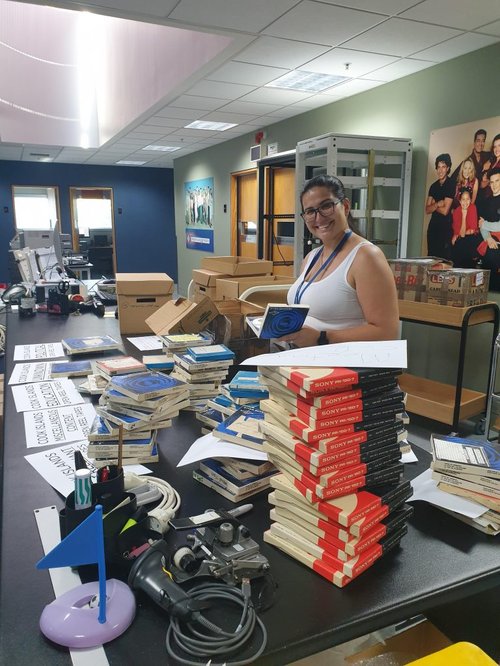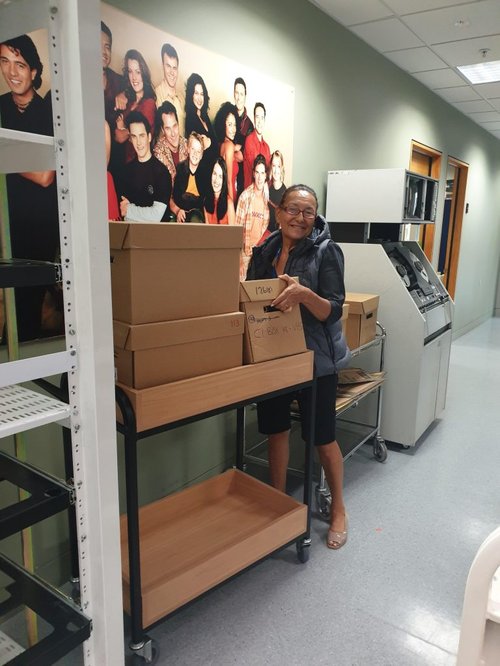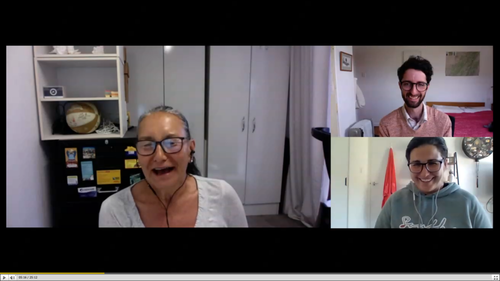
What do you do when you’re working on a special archiving project in another country and a pandemic hits? If you’re Susan Love and Kate Ngatokorua from the Cook Islands Ministry of Cultural Development (MOCD) – Tauranga Vananga, you take a deep breath and try and roll with it. Material from the Cook Islands National Archive has been cared for in Wellington by Ngā Taonga since 2013 and the pair were working through this collection – preparing it for digitisation – when COVID-19 changed the way much of the world works.
Although they were due to go home in mid-April, for now, they’re both still in Wellington. Ngatokorua was flatting with friends for the duration of the project while Love – who spends her time between the capital and the Cook Islands – is at home with her husband and two sons. ‘It’s definitely been a bit of a shock’, explains Love, ‘and frustrating that the project is on hold’. However, when we have a video call under Level 4 lockdown in late April, they both seem in very good spirits – there’s plenty of laughter and smiles – and accepting of how things have gone.
Hero image: Cook Island Archivists, Kate Ngatokorua & Susan Love, with Ngā Taonga's Chief Executive, Honiana Love (left).

Kate Ngatokorua working at Motutawa – Avalon.
It seems like the lockdown-enforced changes will be just a temporary pause on what is an exciting and successful project. Nearly 6,000 audiovisual items were transferred to the care of Ngā Taonga in a wide range of formats. Ngatokorua and Love were in the country for the third and final push to get this material accessioned (given a basic archival description) and ready to be digitised.
With the help of government and UNESCO funding, the pair were over halfway and tracking well to complete the project, based at the Hutt Valley offices of Ngā Taonga. ‘We were working at Motutawa – Avalon and it was fantastic. It was a really positive environment and the people were great. Our workstation was completely surrounded with material,’ laughs Love. ‘We were fully in the swing of things – it was so nice to work on this project again’.
Like all archival work, time and the environment can degrade the material. With these items from the tropical Cook Islands, though, there were some unexpected surprises. ‘There was dirt and mould,’ describes Ngatokorua. ‘There were also some remains of geckos and their eggs. Mostly in the covers of the open reel tapes, though it was very rare to come across.’

Susan Love working at Motutawa – Avalon.
Stored on these tapes and film are of course significant cultural records. For Ngatokorua, she loved hearing a special chant called Mire. ‘It’s from my island of Mangaia and I hadn’t heard it before. But it’s part of the Fanshawe Collection. It was so eerie to hear. It will be great to return it to people and revive it. And it’s great to do it now while we have the old people to explain some of the context. Once they’re gone, it’s harder to make that connection.’
For Love, recordings of tapa cloth being made are invaluable. ‘It’s a dying art in the Cook Islands, though it exists elsewhere in the Pacific,’ she explains. ‘There is a tape of a tapa exhibition from 1988 and I’m hoping it will include some workshopping, showing the tapa being made. That would be good to see.’ She also loves seeing recordings of ceremonial events, investiture and hair cutting. ‘The Tangi Kapi collection contains a lot of this material,’ she explains.
The pair take on a more sombre tone when they discuss seeing footage of the aftermath of Cyclone Martin, a hugely destructive 1997 storm that killed 28. ‘People don’t really talk about it,’ says Ngatokorua. ‘I remember hearing when I was little that a huge wave went right over the island of Manihiki. You wouldn’t know what the island looked like before that hit.’

Communicating in Level 4 – Meeting via video call. (Left Susan Love, Top Right David Klein, Bottom Right Kate Ngatokorua).
Though another major incident is affecting almost every part of the world, the Cook Islands are thankfully COVID-free. At the time of speaking, Ngatokorua and Love remain in limbo. A ‘double quarantine’ is in place with travellers having to isolate for two weeks before and after flying to the Islands. It’s uncertain whether they will return to the Cooks or stay on in Wellington – there are many unknowns with the pandemic.
They’re both keeping busy in the meantime. Ngatokorua works as a policy analyst for the Ministry of Cultural Development and she’s focused on a proposal for equipment for the newspaper collection. ‘Last year we received a new scanner and workstation,’ she explains. ‘We’ve digitised the newspapers from 1958 to 1980 and are planning to go up to 2000.’
Love, meanwhile, has been exploring cataloguing work. ‘That’s been interesting – a real learning curve. I made a draft catalogue template and sent it to the Cook Islands. They verify details, especially people’s names.’
Our conversation is punctuated by lots of laughs and smiles. It’s undoubtedly a strange and unprecedented time, wherever you are in the world and whatever you do. But for Kate and Susan, spending a little longer in Wellington with the prospect of soon finishing this project isn’t such a bad place to be.